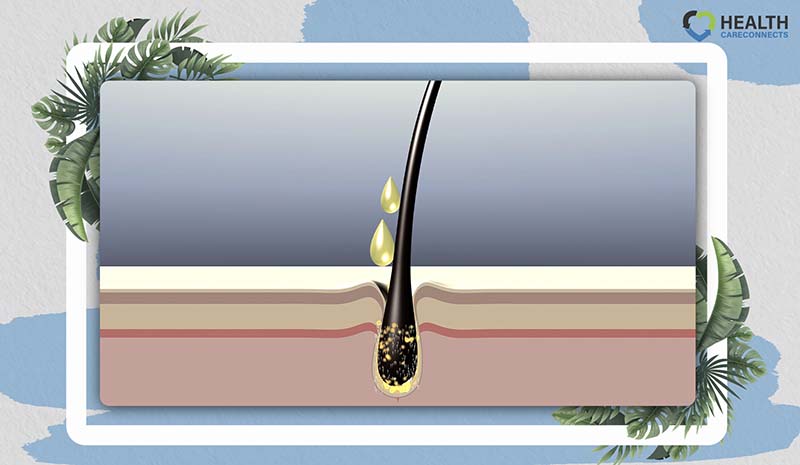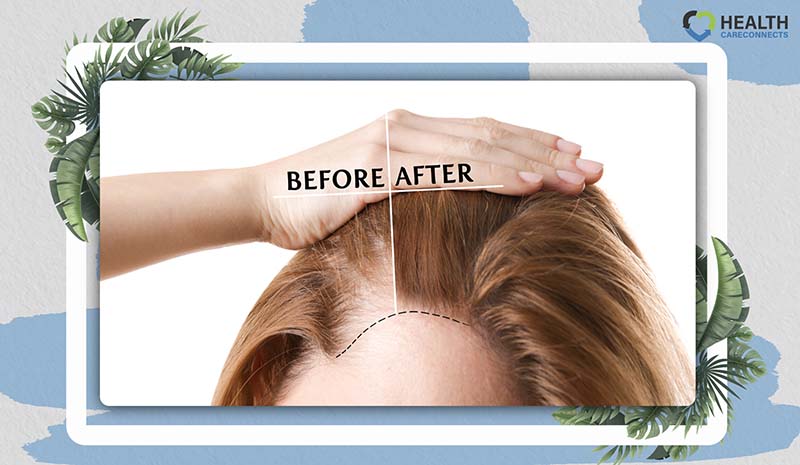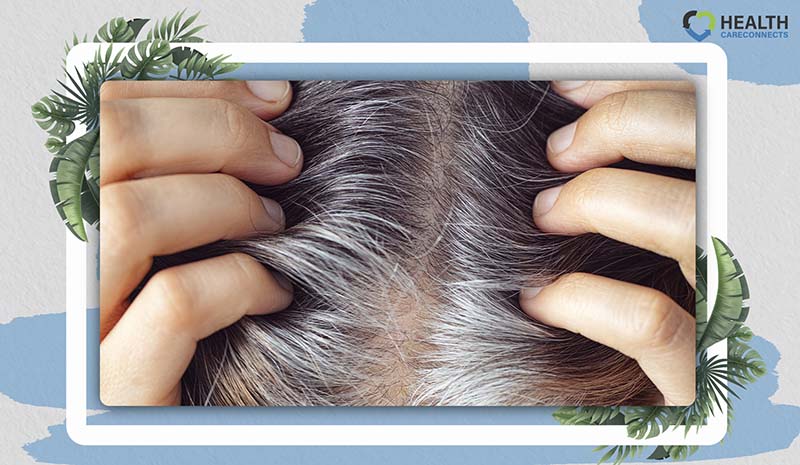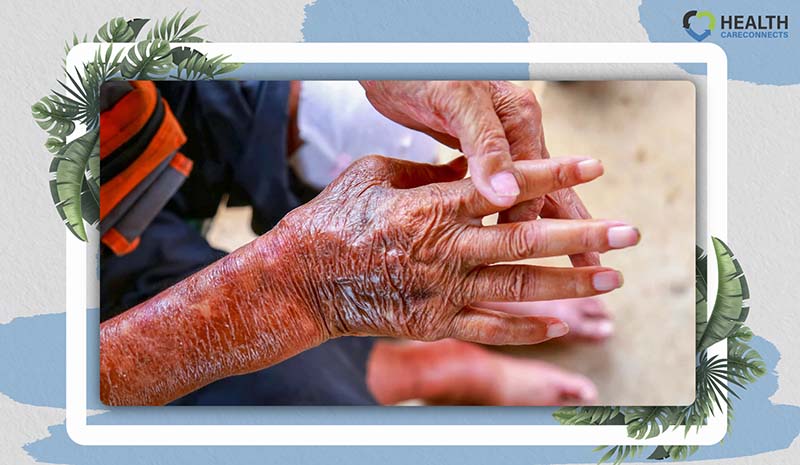Are you worried about thinning hair or premature graying? Do you wonder if your collagen supplement could be contributing to hair loss? In this blog, Health Connect invites you to explore the connection between collagen and hair health, answering the critical question: “Can collagen cause hair loss?“
Discover how collagen can benefit your hair, the best types to use, and what you need to know about maintaining luscious locks. Dive in to find out how collagen could be your key to healthier hair!
Ways Collagen Improves Your Hair
Protects Hair Follicles from Damage
Collagen serves as an antioxidant. And antioxidants can combat damage caused by free radicals. Free radicals form in your body due to stress, air pollution, smoking, poor diet, alcohol, and other environmental factors.
They can harm your cells, proteins, DNA, and hair follicles. Thus, antioxidants in your collagen protect your hair from damage.

Prevents Age-related Hair Thinning
Collagen constitutes 70% of your dermis, the middle skin layer housing the root of each hair. As you age, collagen production and cell replenishment in the dermis decline, leading to hair thinning.
That is why you should provide your body with collagen. This practice helps maintain a healthy dermis, potentially preventing age-related hair thinning.

Slows Down Hair Graying
Thanks to its antioxidant properties, collagen may combat cell damage and slow hair graying. The melanin-producing cells that give hair its color naturally diminish with age. Free radicals from poor diet, stress, and pollutants can also damage these cells.
By fighting free radicals, collagen may protect melanin-producing cells, potentially preventing your graying.

Supplies Amino Acids for Hair Growth
Hair is primarily composed of keratin protein, which requires amino acids like proline for synthesis. Collagen is rich in proline.
Therefore, it provides the necessary building blocks for keratin production, supporting hair growth.
Simple to Incorporate into Your Routine
Collagen can be added to your diet easily. It can be found in the skins, bones, and muscles of chicken, beef, pork, and fish. Collagen production is also boosted by vitamin C-rich foods like oranges and bell peppers.
Collagen supplements, available as pills or powder, are typically hydrolyzed for easier absorption. Remember to combine collagen with a healthy lifestyle, including reducing stress and avoiding smoking. This can maximize its benefits for your hair.
Which Collagen Type Is Best for Hair Growth?
Different types of collagen offer various benefits, with Types I and III being particularly effective for hair health. Type V also plays a crucial role in collagen formation, contributing to overall hair growth.
- Types I and III Collagen Types I and III collagen are known to enhance hair strength, thickness, and overall health. These types are commonly found in the skin, tendons, and bones, and they support the structure and integrity of hair.
- Type V Collagen Type V collagen is essential for the formation of Types I and III collagen. It supports the overall collagen matrix in the body, ensuring that the hair receives the necessary structural proteins for growth and health.
The best collagen supplement for hair growth is the one that suits you. When looking for a product, focus on the quality and source. Ensure that the supplement is hydrolyzed, as this form is more easily absorbed by the body. It’s also important to choose supplements free from fillers and unnecessary additives, as these can dilute the effectiveness of the collagen.
How Does Collagen Influence Hair?
Once ingested, collagen is broken down by the digestive system into amino acids. These amino acids are absorbed into the bloodstream and transported to various parts of the body. Your skin, nails, and hair benefit from your collagen consumption in this manner.
This process supports the formation of new collagen, which can benefit hair health by potentially making it shinier and more resilient.
Can Too Much Collagen Cause Hair Loss?
Collagen supplements generally do not cause hair loss. However, there is a specific medical condition called scleroderma (or systemic sclerosis).
Scleroderma results from an overproduction of collagen in the body. It is an autoimmune disease where the body attacks healthy tissue, causing several skin-related complications.
Understanding Collagen Intake
The human body typically requires about 10,000 mg (10 grams) of collagen daily. Taking a 10-gram collagen supplement each day can help resist signs of aging in the future.
However, individual needs can vary, so it’s important to tailor your collagen intake accordingly.
Consultation and Personalization
While the general guideline is beneficial for most, it’s crucial to consult a healthcare professional. They can provide personalized advice based on your specific health needs and conditions.

How Long Until Collagen Improves Hair?
There is limited scientific evidence to say the exact duration for collagen supplements to improve your hair. The hair growth cycle varies among individuals, influencing how quickly results are seen.
Some users of collagen supplements have reported improvements in hair texture within just two weeks of consistent use. Others reported seeing noticeable growth after about a month or more of regular collagen intake. Due to the slow rate of hair growth, maintaining a consistent collagen regimen is essential for achieving the best results.
Conclusion
Can collagen cause hair loss? No, too much collagen does not lead to hair loss. On the other hand, collagen offers numerous benefits for hair health, from protecting hair follicles to preventing age-related thinning and graying. By incorporating collagen into your routine, you can support stronger, shinier, and more resilient hair.
Have you experienced improvements with collagen supplements? What is your best collagen powder for hair? Share your stories in the comments below! For more insights on maintaining healthy hair and overall wellness, explore our other blogs on Health Connect.

Dr. Joyce Slater: Your Guide to Informed Health Choices
Dr. Joyce Slater shines as a distinguished expert in the field of nutrition and public health. Contributing her vast expertise to HealthConnectbc, she embodies a deep-seated passion for enhancing public well-being. As a respected figure in her field. Dr. Slater’s academic journey and professional achievements are nothing short of inspirational.
Holding a significant position as a researcher and educator, Dr. Slater has delved deeply into the intricacies of food literacy and nutritional science. Her work, prominently featured in numerous esteemed scientific publications, underscores her dedication to expanding our understanding of food’s role in health and society.
At the heart of Dr. Slater’s professional ethos is a profound desire to positively impact individual lives through education and research. She often says, “Empowering people with the knowledge to make healthier choices is the most rewarding aspect of my work.” This principle is the cornerstone of her involvement with HealthConnectbc, where she strives to provide reliable and practical health advice.
Dr. Slater’s contributions to HealthConnectbc are multifaceted: academically, she offers insights into the complex world of nutrition and health, enhancing both public understanding and professional practices. Additionally, she is instrumental in guiding and inspiring the next generation of health professionals, thus fostering future excellence in the field.
Juggling rigorous research with her educational duties, Dr. Slater demonstrates an unwavering commitment to her profession. Her approachable nature and genuine concern transcend the confines of academia, touching the lives of everyone she interacts with. Dr. Slater looks forward to continuing her journey of discovery and education, dedicated to the ongoing improvement of public health and nutrition.
At HealthConnectbc, Dr. J. Slater is not just a contributor; she is a guiding light, dedicated to enlightening and motivating individuals towards a healthier and more informed lifestyle.
PUBLISHED ARTICLES
- Food literacy competencies: A conceptual framework for youth transitioning to adulthood (2018)
- Self-perceived eating habits and food skills of Canadians (2016)
- Challenges to acquiring and utilizing food literacy: Perceptions of young Canadian adults (2016)
- Socio-demographic and geographic analysis of overweight and obesity in Canadian adults (2009)
- Sustainable well-being: Concepts, issues, and educational practices (2014)

